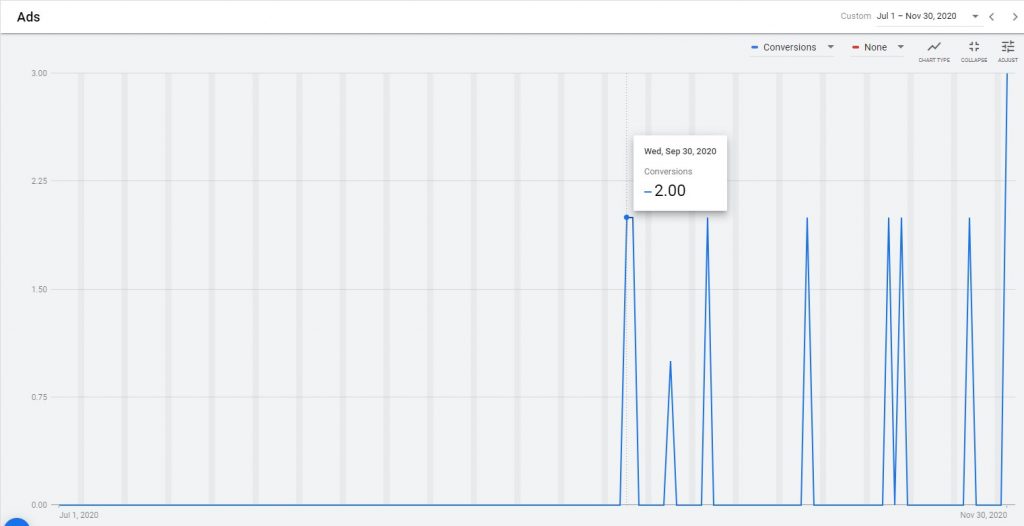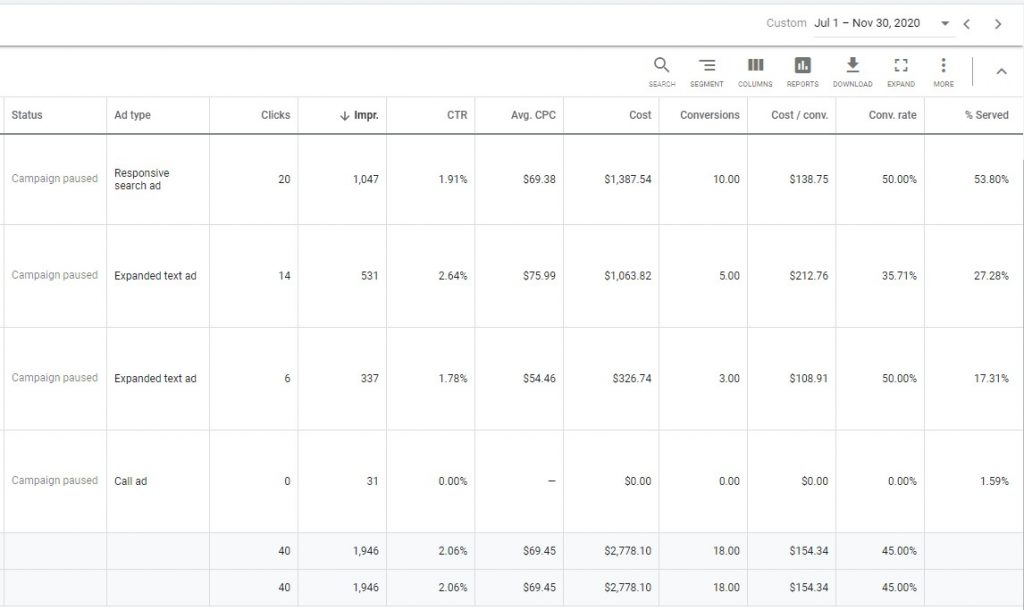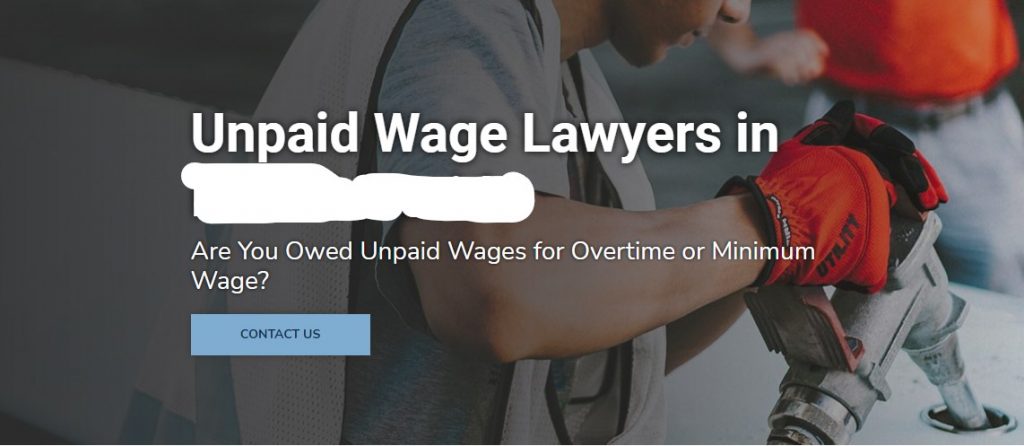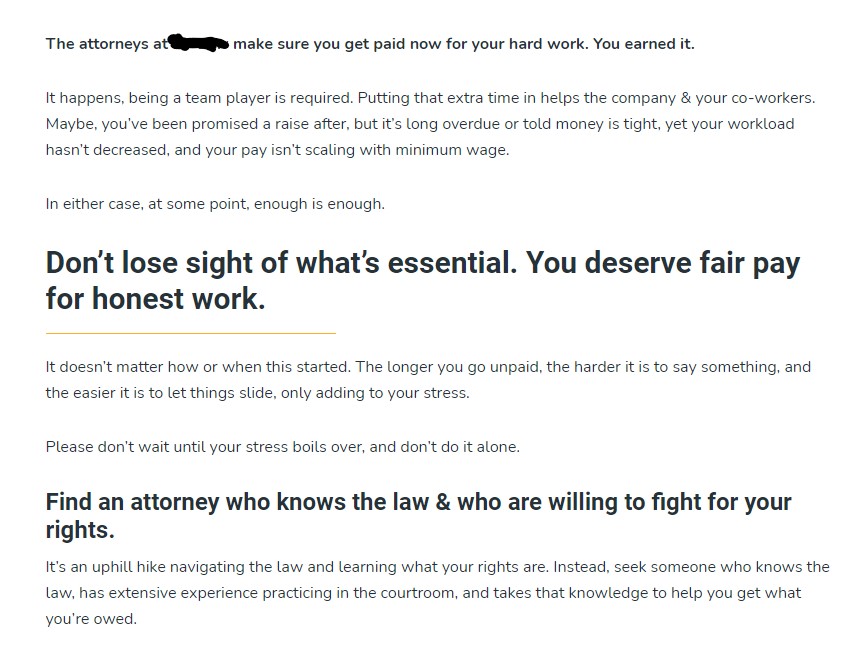Lawyers, Be Clear About How You Can Help: Landing Page Case Study
Optimizing Landing Pages for Actionable Language
Actionable language begins by asking yourself, “How can I help my user?”.
What are the common threads shared by the majority of your clients, and before scrolling down the page, what is it they need to know first?
In essence, DON’T BURY THE LEAD, tell people what they need to know.
Let’s dive into the results of this case study before I sell you further on actionable language.
Tell People What They Need To Know!
We launched ads for this campaign at the end of July 2020 and didn’t see results until September. Starting first by optimizing the campaign in an attempt to bring in more volume and lower the cost per acquisition (CPA), but it still wasn’t driving conversions once folks clicked and landed on the page.
Why so long before seeing results? Why the sudden change in conversions from 0% to 45% average?
Because we re-wrote the language to tell users upon landing on the page, that my client can help them with their legal matter!
Timeline & Results From The Campaign Level
Here’s a granular look at the data. One caveat, this campaign is incredibly niche and didn’t attract large numbers of visitors, but the change in conversions from 0% to 45% was a sharp contrast once we changed the text/copy on the page.


I get it, being this forward, can come off like a hard sell, even tacky, but it’s crucial to tell folks what they need to know without having to scroll or decipher a brick of text.
Let’s get into why this works, and how we can shape ourselves as an authority sharing how they can help users with their legal matters.
Be Clear About How You Can Help
The landing page had useful content, the issue was that the content spoke only about the law, not providing any context to how my clients could help their users with legal matters.
You have to put yourself in the user’s shoes. They’re on the web, most likely on their phone, and depending on your practice area, pressed for time. Now mix this into the browsing habits of average users, which is just that, browsing!
The average user on the web is skimming content for what they need, on the web, folks are typically researching and looking for answers on the go, especially these days with ~50% of web users are on mobile screens, and Google’s mobile-first indexing.
Now let’s add on stress from a potential legal matter that needs resolving.
Writing Tips for Appealing to Your Audience
Knowing that your audience is online, and regardless of their education, are primarily skimming your content. What are they seeking? Key phrases mostly, words that stand out, and address their particular issue.
This is why your most important points should be made in:
- your headings,
- followed by the bolded text in your paragraphs,
- then bullet points
- even line spacing plays a role.
Make Headings Clear & Concise: Don’t Bury The Lead
The Term “burying the lead” comes from journalism, reading any successful news publication you’ll know what exactly is going on from the article title and supporting headings.
Any and all useful information should be easily gained from your headings, providing any important information under your headings in bold or underline text. All other content is supporting your main point.
This is What Revealing The Lead Looks Like:
This is the landing page hero image and tagline, notice that visitors know exactly what this page is about, and how my clients can help.

Break up your content into easily digestible chunks
Formatting the text on your page is crucial as well, by breaking up your content into easily digestible chunks you’re not overwhelming your user with a wall of words made from bricks of text.
Notice in the image below that paragraphs are broken up, with each point expressed in 1-3 sentences, and spaced apart. If this were literature, you’d expect this content to be densely packed together on the page.
Remember, for the web, and for your landing pages, we are informing without overbearing, and if a denser read is warranted, then linking to alternative forms of media are useful, like downloadable e-books, pdf documents, or detailed blog content with a glossary of anchor links.

Write in simpler language
Regardless of your user’s education level, writing simpler online is always better. Not only in content pruning, but the vocabulary of the words used.
More sophisticated language takes longer to read, and not good for quickly skimming for what you need, and may come off as pretentious.
Bullet points make content digestible
If you’re writing out a list, or there are multiple points to cover, breaking this content into numbered or bulleted lists can make it more easily digestible by the reader.
Don’t forget to bold any crucial text, and ensure that it appears first, ahead of all other supporting text.
Why are bullet points so useful?
- Separates out important content, making it easier to read
- creates a hierarchy
- Adds space between subject matter
Remember, it’s all about how to provide users with information on how you can help them.
At the end of the day, it’s their legal matter and they need help solving it, and the first attorney whose website can deliver answers to the questions they’re asking, and providing that consistency throughout.
Lastly, don’t forget to ask for the sale by inviting users to reach out by contacting you.
Other Online Resources for You to Explore:
- Using Actionable Language That Converts Users Into Leads
- How Law Firms Can Attract New Clients Using Video Marketing
- 7 Features of Highly Effective Content
Books To Explore:
- Made to Stick – Covers burying the lead & more
- Don’t Make Me Think – Covering writing basics & Design for the Web
